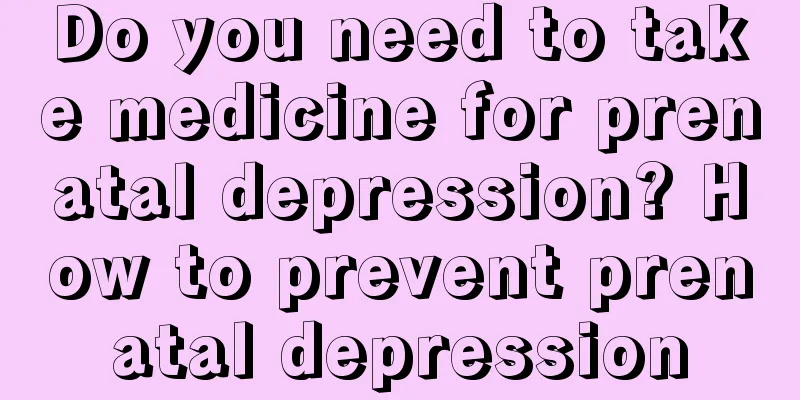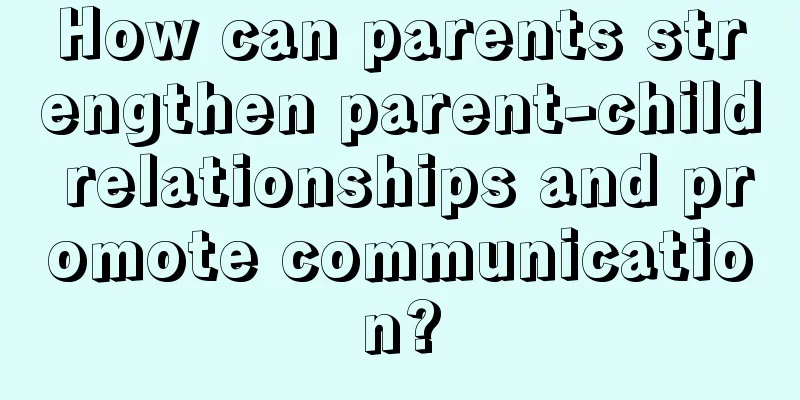Do you need to take medicine for prenatal depression? How to prevent prenatal depression

|
Prenatal depression is a very dangerous disease, but in fact the chance of pregnant women suffering from prenatal depression is very small, and pregnant women should be very careful during pregnancy, so let's find out whether prenatal depression requires medication? How to prevent prenatal depression? Do I need to take medicine for prenatal depression?Studies have shown that if a pregnant woman suffers from prenatal depression, whether she has received drug treatment or not, the statistical impact on the two indicators of fetal birth malformation rate or miscarriage rate is not much different, but the specific situation should be based on the pregnant woman's condition and the doctor's guidance and advice, and the pros and cons of risk-related factors should be fully weighed before making a decision. Since the fetus can feel the mother's emotions at the first time, if the pregnant woman has moderate to severe prenatal depression and does not receive drug treatment, it will also cause fetal malformation or miscarriage. Pregnant mothers with prenatal depression should not take medicine at will, or increase or decrease medicine, but should communicate more with doctors and listen to the doctor's professional opinions. Prenatal depression is a "normal" reaction caused by changes in physiology and life rules, habits, work and rest, which is adjusted over time or after the birth of the child. Although prenatal depression is persistent, excessive, abnormal, depressed, depressed and other negative emotions and thoughts, accompanied by obvious physical reactions (excluding pregnancy reactions), therefore, whether you will objectively and correctly understand your situation, if you don't trust it, you can go to the hospital for a psychological evaluation, but don't do STH without authorization and scare yourself. How to prevent antenatal depression1. Comfort yourself. Expectant mothers should maintain a happy mood and stable emotions. Do not put too much pressure on yourself, and do not have too many demands on having a boy or a girl. 2. Actively learn about childbirth knowledge. Some time before delivery, expectant mothers can read the common knowledge about delivery and postpartum hygiene to reduce the fear and tension of childbirth. 3. Carry out appropriate outdoor activities. Expectant mothers can ask expectant fathers to take you out for some fresh air, such as taking short trips, doing prenatal exercises, swimming, etc., and appropriately participate in some social activities. 4. Avoid excessive work/labor. Expectant mothers should not work more than 8 hours a day and should avoid working night shifts. If you feel tired at work, you can take a short break for about 10 minutes if conditions permit. How many months does antenatal depression appear?Depression is a mental illness with significant and persistent low mood and pessimism as the main clinical manifestations. Patients complain of being in a bad mood, worried, sighing, and in severe cases, they feel like dying, pessimistic and desperate. Patients will also have a decrease in interests and hobbies. Things they liked in the past, they no longer like or have lost interest in, and they have no interest in doing anything. Patients have low self-esteem, low self-esteem, no confidence in the future, feel hopeless, and even pessimistic and desperate. Severe cases will lead to self-blame and negative suicidal ideas and behaviors. Antenatal depression refers to the above symptoms that patients experience from pregnancy to before delivery, which may be accompanied by excessive worry about the health of the fetus and related issues such as the upbringing and growth of the child after delivery. How terrible is prenatal depression?Prenatal depression is a mental disorder that occurs during pregnancy and is characterized by low mood, loss of interest, and other symptoms. It is accompanied by varying degrees of cognitive and behavioral changes, and may be accompanied by psychotic symptoms. It manifests as significant and persistent depression and pessimism, thinking disorders, decreased consciousness, cognitive impairment, and physical symptoms. If prenatal depression is not treated in time, it will cause harm to mother and child, such as premature birth, fetal growth restriction, postpartum depression, suicide, etc. Prenatal depression is a problem that is increasingly receiving attention, and it is also a problem that is becoming more and more terrifying. Before delivery, pregnant women may be alone at home, and if it is the first time to give birth, they will be nervous and easily think too much and become depressed and talkative. If they do not go to the hospital to see a psychologist for professional counseling and treatment in time, it will have a particularly great impact on the child and the pregnant woman herself. |
<<: What should be checked during pregnancy preparation?
>>: What are the dangers and embarrassments during childbirth?
Recommend
How to prevent premature birth? 5 things expectant mothers should do
Premature babies are weaker than normal babies. T...
Is IVF sexual or asexual? Does IVF have ectopic pregnancy?
IVF is an advanced medical method for treating in...
How to wash diapers for newborn babies
The urinary system of a newborn baby is not well ...
How long after a normal birth can you have sex?
Women are weak after childbirth and need to recov...
What are the symptoms of intellectual disability in premature babies? Will premature babies have intellectual disability?
What are the symptoms of intellectual disability ...
Can you eat coix seed when preparing for pregnancy? What are the benefits of eating coix seed during pregnancy preparation?
Women need to pay special attention to their diet...
What are the symptoms of baby dehydration in summer? What are the symptoms of baby dehydration in summer?
What are the symptoms of baby dehydration in summ...
Will a pregnancy pillow squeeze the fetus? Is cotton or latex better for pregnancy pillows?
Pregnancy pillows are a product that most pregnan...
How to relieve morning sickness? These few tips can make pregnant mothers feel more comfortable
The happiest time for a woman is when she is a mo...
There are several ways to give birth. Which one is the best?
As the times continue to progress, childbirth has...
Can eating more bananas help you have a boy? Can eating more bananas help you have a boy?
Some mothers love to eat bananas and want to have...
Will a normal birth affect the couple's future life? How to prevent vaginal relaxation after a normal birth
When it comes to the way of giving birth to a bab...
How long can I keep the milk powder if I can't finish it? Is it normal for the milk powder to have particles after being soaked?
When milk powder is damp, it tends to clump. If i...
How can women increase their chances of having a baby? What kind of women are more likely to have a baby?
Children are the angels of every mother. Every wo...
After the marriage leave in 31 provinces was released, the marriage leave is really only 3 days
According to the latest news, late marriage leave...









